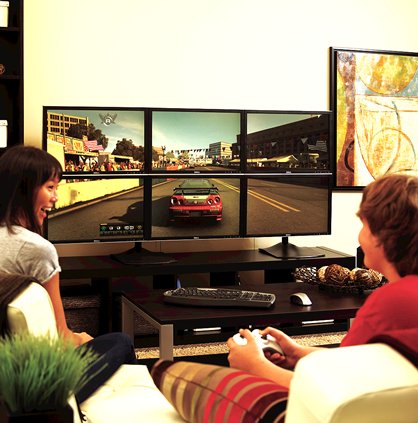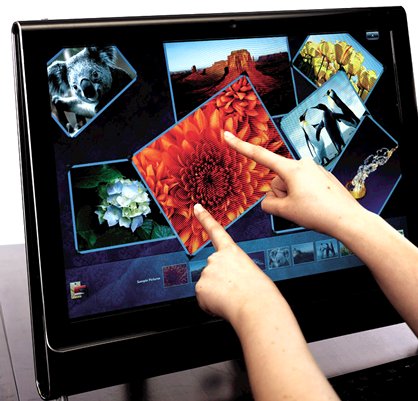Is Windows 7 a revolution for PC gamers?
We investigate whether number 7 makes up for the Vista-fail
The hype machine surrounding October’s launch of Windows 7 has come and gone, and there are still plenty of gamers yet to be sold on the direct benefits gained from shelling out for the new OS. Perhaps it’s those raw emotional scars, painfully scratched by the memory of that Vista upgrade. Or, more likely, they have yet to actually play a DirectX 11-powered game that shows off what Windows 7 is going to do for PC gaming.
Alternatively, if you have already installed Windows 7 but have still to push DirectX 11 gaming to its current, hugely-impressive limits, it’s likely that you don’t fully understand what’s under the hood of Microsoft’s new OS. Sure, it makes your PC faster, more stable and secure, gives it a bit of spit and polish with a more Mac OS X-esque look and feel, but what else has it delivered?

Above: Video walls are also supported in Windows 7
Brian Joyce of Alienware says, “Windows 7 is a must-have for PC gamers because it outperforms XP and Vista where gamers will notice it most: in games. Dell are experiencing a nearly 10% increase in select in-game benchmarks over Vista, nearly 20% quicker boot times, and full DirectX 11 support.”
Microsoft UK’s Leila Martine told us, “With Windows 7 we’ve made a lot of enhancements around general performance, which is the baseline, in terms of decreasing the overall size of the OS, making sure the memory footprint was a lot smaller, so that overall the PC is a lot snappier and things like start-up and resume times are much quicker.
“2010 and 2011 will be very good years for PC gaming. I mean, the stuff that we see coming through on console tech is all about reviving the console – stuff like Project Natal which is aiming to make Xbox 360 more accessible to a wider market. Also, it looks like the console vendors are keen to make lots of public announcements about how they are not updating their hardware over the next year. Previously there’s been a sense in which console hardware development has acted as a kind of drag or brake on PC gaming hardware development. But now with DirectX 11 you can take many of the assets from an Xbox 360 or PlayStation 3 game and simply render them at a far higher quality than is possible on those two devices.”
Martine holds the impressively lengthy job title of Windows Consumer Business Group Lead, which means she is the authority on what Windows 7 means for gaming. She sees the user-interface design, stability, and speed improvements as combining to make an important starting point. “Because when we start to think about the future of gaming on the Windows platform, there are so many new devices that are coming out on the market such as netbooks, touchscreen desktops, new high-end PCs, all of which bring new opportunities to PC games developers.”
Sign up to the GamesRadar+ Newsletter
Weekly digests, tales from the communities you love, and more
Touchscreen control has been one key aspect of Windows 7 hyped by Microsoft. Martine confirms that, “In terms of incorporating touchscreen input into power gaming, our corporate team at Microsoft is continually talking to games developers about what they need and how we can work with them to help them deliver it.”

Above: Windows 7’s touchscreen controls could genuinely revolutionize gaming
What Microsoft refers to as the ‘touchscreen ecosystem’ is being developed very quickly, with the software giant promising us new and different types of touch-controlled games within the year. Details on exactly what these might be are currently scarce. Martine remains resolutely tight-lipped when pressed on plans to bring Project Natal to the PC.


